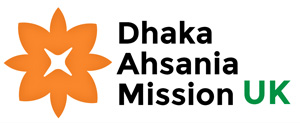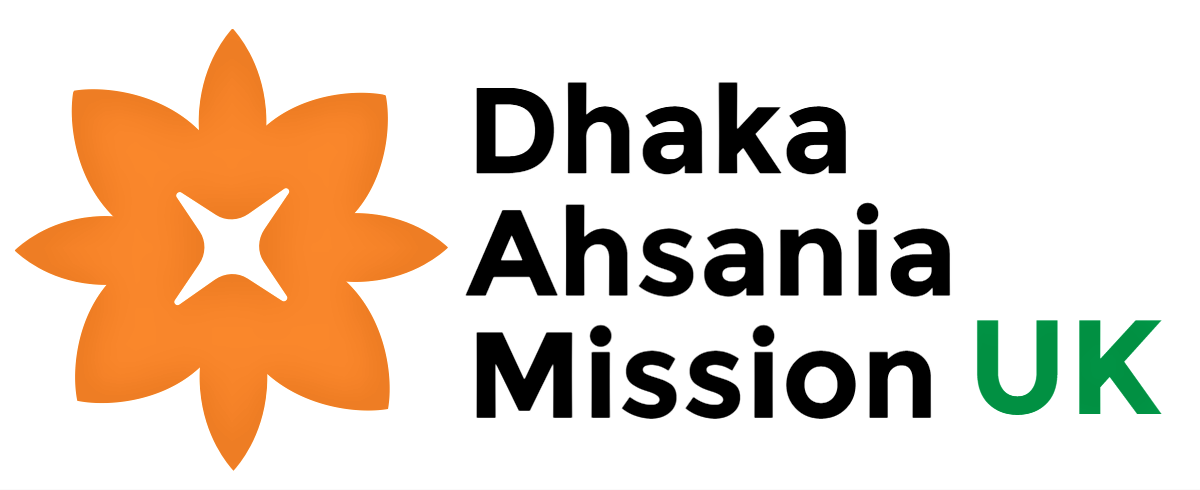Education
Context:
In Bangladesh, 6.7 million children are out-of-school and 13% of children are involved in child labour (UNICEF). Despite increasing school enrolment over recent years, progress has stalled and Bangladesh is struggling to get the last 15% of children, the hardest-to-reach, into education.
Our Approach:
DAM UK works to ensure that out-of-school children enjoy quality education. We work with out-of-school children, their families and wider community, motivating and enabling enrolment at one of Dhaka Ahsania Mission’s non-formal education centres. Here they receive quality education, tailored to their individual abilities while working towards nationaly-recognised exams. Having been encouraged and supported into a learning environment, 85% of the children leaving our programme go on to enrol at a mainstream provider, like a government school, for the next step of their education.
Our Projects:
We provide centre-based and outreach services to children living and working on the street in Dhaka.
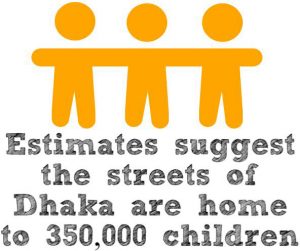
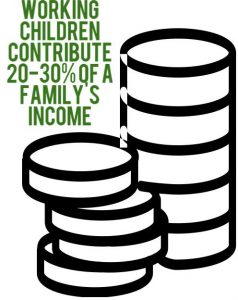
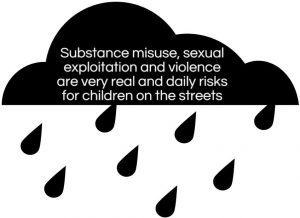
At dedicated centres and in outreach services we provide a safe environment for street children to enjoy education, develop life skills and build self-esteem.
Our services include
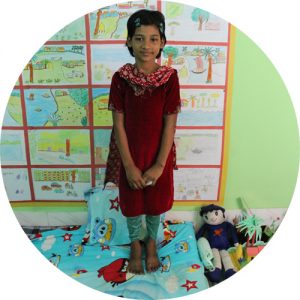
Bianca is nine years old and lives with her grandmother in Dhaka. They both work hard to give themselves a better future. Each morning they collect litter and sell it to a recycling merchant. The work is dangerous and they often cut or injure themselves. After working in the morning, Bianca attends the Drop-In centre where she gets help to learn to read and write. Bianca hopes to attend a mainstream school in the future and train to become a teacher.
“I often see other children my age carrying their books and going to school. I hope I can be one of them in the future. I love the education at the centre and without the centre I wouldn’t have any education at all”
Health
Context:
In Bangladesh 48% of the population are drinking unclean water (World Bank). The lack of universal access to clean water and sanitation has far-reaching and life-long impacts: sickness caused by drinking contaminated water can prevent school attendance or the opportunity to work; infections caused by drinking dirty water impairnutrient absorption impacting childhood growth.
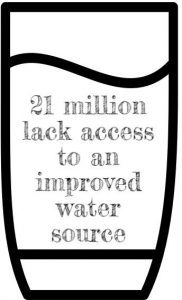
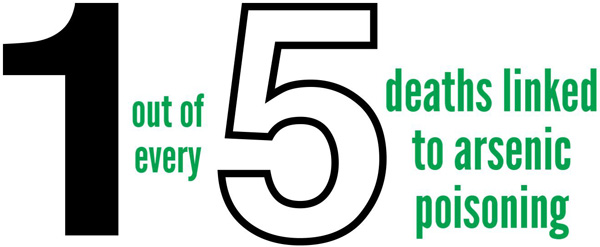

Our Approach:
DAM UK provides support to communities that lack universal access to clean water and sanitation. Projects are designed to meet the requirements of the local community and geology. The local community is trained in maintenance and good hygiene, ensuring the benefits of improved water and sanitation facilties are maximised and sustained.
Our Work:
We focus on:
Installing community managed wells and filters for safe water
- Renovating and building school, community and household toilets
- Safe bathing facilities for women
We work with the community to identify specific needs and run campaigns in schools and the community around handwashing and hygiene to increase the project’s impact. We also work with the local and national government to help strengthen their ability to provide water and sanitation services.
Our work aims to:
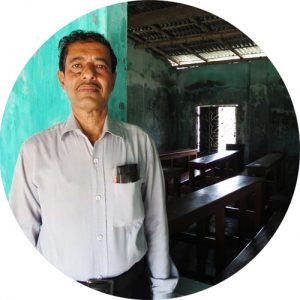
Mohammed is the Head Teacher at Tirali Girls High School in Satkhira District. Despite lobbying the local government and due to a lack of funding, the toilets at Tirali School were in an extremely poor condition with crumbling walls, no locks on the doors, no running water and little privacy. It was no surprise that they were heavily underused and actually discouraged the girls from attending school, particularly if they were menstruating.
“The new toilets have meant more girls are now applying to come to the school. During the inauguration ceremony I invited the community and family and told them about our new facilities, which are very private, safe and clean.”
Now with a brand new toilet block the pupils can attend school with dignity. The toilets have now become a facility the school is proud to promote and enable girls to work hard once again for their futures
Economic Development
Context:
The Bangladesh economy has experienced significant growth over the past 15 years. But still 20.5% of the population live below the poverty line. Engrained poverty prevents people from achieving adequate nutrition and acts as a barrier to children attending school and to the sick securing health care. It is estimated that 16 million people have slipped into extreme poverty in Bangladesh as a result of the COVID pandemic.
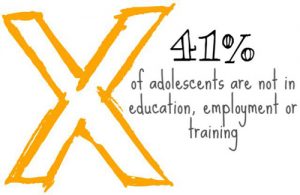
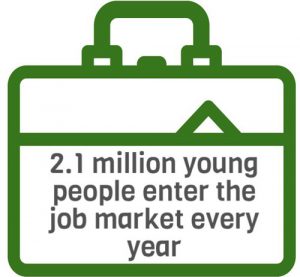
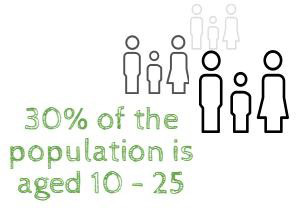
Our Approach:
Our work focusses on providing skills training for adolescents and adults living in poverty. We link trainees with livelihood opportunities, either as employees or as self-employed, increasing their ability to make an income. The trades we provide training in match market demands. Training includes leadership, negotiation and communication, ensuring trainees have the confidence and skills necessary for the workplace.
Our Work:
We work with female smallholder farmers to increase their skills and knowledge of agricultural techniques and links to input (such as seeds and tools) and output markets.
We also provide vocational training in trades such as tailoring and dressmaking, mobile phone servicing and electrical engineering.
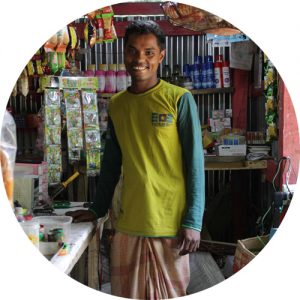
Mohammed successfully completed a vocational course in mobile phone servicing. He has now opened a multi-purpose shop in his village: a general store selling snacks and a mobile phone servicing desk. He rents the shop space and employs two young men to run it whilst he operates the mobile phone servicing desk and also offers a mobile phone charging facility.
“I have recently opened my shop and it is going well. Before I wasn’t in school. The schools were far from my home and my family needed help on the farm. I am determined for us to live a better life. I hope that having a shop and a mobile servicing department will mean I can attract more customers. I can stay in my village now and support my family’s future”
Humanitarian Response
Context:
Bangladesh, a low-lying country with an extensive river network and long coast-line, has always been prone to cyclones and riverine flooding. But climate change is increasing the frequency and intensity of these hazards, causing ever greater hardship.
Since 2017, Bangladesh has hosted almost one million Rohingya refugees who fled violence in neighbouring Myanmar.
Our Approach:
Our partner, Dhaka Ahanisa Mission has extensive experience of responding to humanitarian crises. In the time of crisis, following local needs assessment and coordination with Government and non-govermental agencies, DAM UK stands ready to mobilise resources where required.
Recognising the links between relief and development initiaitves, we build distaster preparedness into our development initiatives and support timely rehabilitation initiatives post-crisis.
Our Work:
Since 2017we have provided food, non-food items and water & santiation facilities in the Rohingya refugee camps. We have also extended support to neighbouring host communities.
We have provided food and seeds and tools to famers impacted by flooding, providing both humanitarian and rehabilitation assistance.
Since 2020 we have provide food and hygiene kits to vulnerable households in urban areas impacted by the COVID pandemic.
